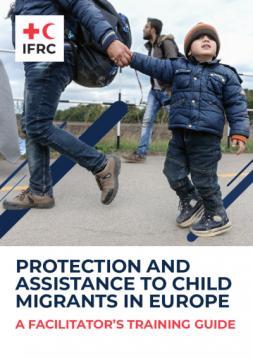The IFRC’s global presence, auxiliary role, and focus on the most vulnerable means it is uniquely placed to prevent and alleviate suffering through humanitarian action; to help uphold the rights and dignity of all migrants; and to assist migrants in integrating into host societies.
In the migration journey, children are one of the most vulnerable and at risk of violence. The increase of migration movements at global level represents one of the most significant humanitarian challenges of the 21st century, requiring IFRC and National Societies to expand their needs-based responses and to adopt a broader range of activities in support of migrants, in particular child migrants.
This training toolkit adapts the Child Protection in Emergencies training and uses the child protection minimum standards (CPMS) developed by the Alliance for Child Protection in Humanitarian Action to which the IFRC belongs. It addresses the urgent need to assist any child needing protection and support, regardless of their immigration status, nationality, or background, always treating them as children first and foremost.




